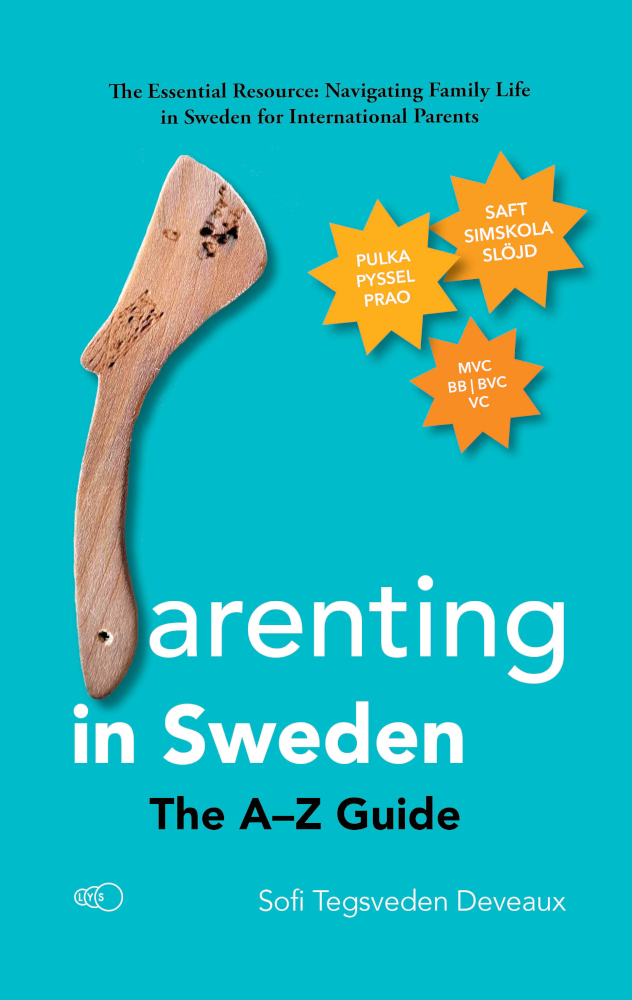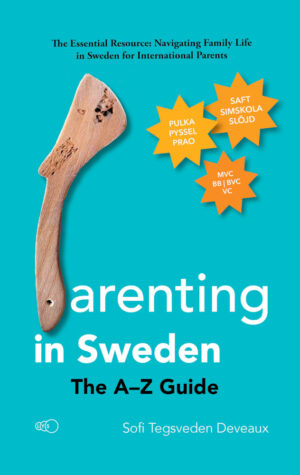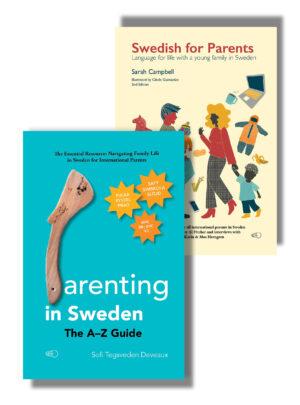In my work, I meet plenty of parents originating from all over the world and who find themselves raising a family in Sweden. Some plan to stay for good, whereas others are here on short-term work contracts or have other reasons for not staying in Sweden for more than a few years. A common dilemma many of them express is if they should let their child learn Swedish through attending Swedish förskola or school, or if it’s wiser to let their child develop their English in an “international” school.
From my experience of helping international parents make the most of their family life in Sweden, I’d like to address some common arguments against children learning Swedish.
“We are only here for a short time”
A short time for you as an adult may not be perceived as a short time for a child. You might feel reluctant to learn Swedish yourself as you are planning to move on to another country soon, but a small child will not perceive time the same way as you, and won’t be able to put aside their current needs for their future one.
If your child is three years old when moving to Sweden and six years old when leaving, they will have spent half of their life in a Swedish-speaking country. Not giving them the opportunity to learn the local language will hamper their abilities to interact with their immediate environment and to make friends. Being part of a social context is an important element for building an identity, and without the local language, your child’s opportunity to do so are limited.
Also, what I have learned during my years coaching is that plans change. Although you may not plan to stay in Sweden the way things look like right now, your plans may change fast. There might be a job opportunity, a relationship, a broken relationship, changed circumstances in your home country or at your destinations, or legal issues. If you end up staying in Sweden longer than you have intended, you may regret not learning the local language earlier.
“Swedish is a small language, I’d rather my child focused on speaking a big language, such as English or Spanish, properly”
Your child can learn both languages. Or three, or four. The value of learning a new language is not only in its future usability, but the way it opens up to new ways of thinking, expressing yourself, and interacting with others.
I have helped international professionals and families to settle into Sweden for more than 15 years, and never have I met one person who regretted learning Swedish, as an adult or a child. And as long as you are in Sweden, speaking the local language will help for taking part of activities, making informed decisions related to education and healthcare, and to feel included in peer groyups.
“There are plenty of international schools in Sweden where my child can get to know likeminded and prepare for a future in another country”
True, there are many förskolor and schools that call themselves international, often implying they will conduct some of the teaching in English. However, most of them are in cities and small towns, and the majority on förskola or grundskola level. If you are living more rurally, your options may be limited. More importantly, there are very few schools on gymnasie level where the teaching is conducted in English, meaning that you are pushing the problem ahead of you at the same time as it’s growing. If your child is taught in English up until school year nine, but need to enrol in a Swedish-speaking gymnasium, they may struggle a lot, as they have not learn subject-related language earlier. Learning the language required for studies at gymnasie level requires much more time and effort than learning the language required to start the first years of school.
Likewise, to get into an undergraduate course at a Swedish university, you will need to prove Swedish language proficiency at CEFR level C1. This can be compared to British universities, that require prospective students to prove English proficiency at CEFR level B2, which is a level that most Swedish children will attain through attending gymnasiet. You don’t know at the moment if your child will want to study in Sweden or abroad, but they have better opportunities to choose if they are able speak Swedish.
“It’s really exhausting to learn Swedish”
It is indeed very tiring and energy-consuming to learn a new language. This applies to children too, even if they tend to pick it up much faster than adults. However, learning a new language from an early age is likely to help them learning more languages in the future. Also, being able to speak more than one language gives them the ability to understand other cultures and ways of reasoning much better.
“I won’t be able to help them with homework and will struggle in my communication with förskola and school”
Many parents worry about being somehow absent from their children’s schooling if the education is conducted in Swedish. It will certainly be more difficult to help out with homework and you may struggle sometimes to understand communication from the school. However, this might as well serve as an incentive for you to learn Swedish too. As for your child, knowing the local language will help you to interact more with your local environment and fully integrate into Swedish culture. You will be able to explore Sweden to a completely different level, and join your child in their journey to become Swedish.
I recognise that these arguments may not apply to every single family and the circumstances they are dealing with. However, I hope I have shed some light on perspectives that you have not yet considered.
How do schools cater for children learning Swedish?
- Children in förskola age take part in the standard activities and learn by interacting with their peers and teachers.
- As children start school, they may be enrolled in SVA (svenska som andraspråk) instead of svenska (Swedish) recognising their needs to work witch challenges associated with speaking Swedish as a second language. Parallel to this, they take part in standard learning, with teachers providing additional support.
- At gymnsie level, children who don’t yet speak Swedish sufficient enough to take part in the program are put in introduktionsklass/språkintroduktion for a year, where they are taught Swedish with the purpose of taking part in the same program as native speakers.
- Children pick up language skills fast, and the more exposure they get to Swedish, the faster it will go. Watch tv shows together, join Swedish-speaking activities, read Swedish books together and help each other learn vocabulary together.
Do you want to learn more about the particular challenges associated with being an international family in Sweden? Parenting in Sweden is your ultimate guide to anything related to bringing up children in a Swedish context.












